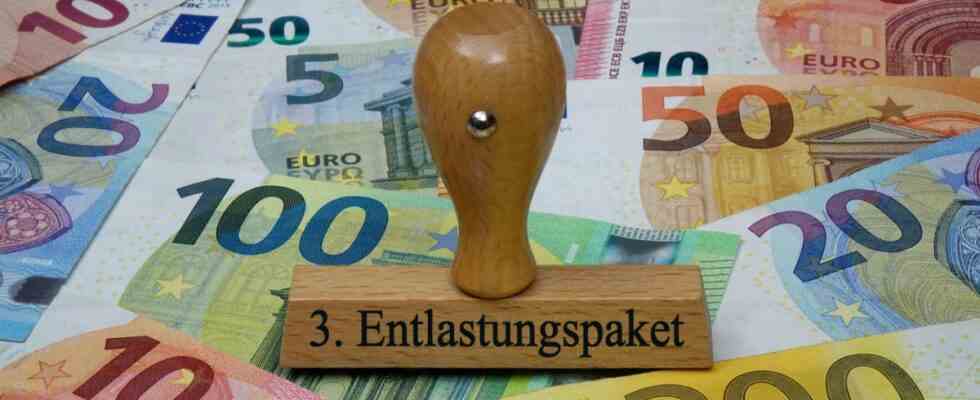The third relief package to cushion the consequences of extremely rising gas and electricity prices, which the federal government decided on Sunday, has met with mixed reactions. The CDU chairman Friedrich Merz criticized in the ARD summer interview that the amount of 65 billion euros only corresponds to the amount that the federal government takes in taxes more than before the crisis due to inflation.
After all, it is right that pensioners and students are now also included in the energy price flat rate, said Merz. The Union and the rest of the opposition had criticized the fact that they had previously fallen through the cracks. But whether the new package is really sufficient for those whose income is just above the housing benefit limit and the social assistance rates, that has to be seen. “You should have done more for those who are just above the limit,” said Merz.
He also believes that the German economy will complain massively in the next few days “that they are not being thought of. And the economy, it’s not the large corporations, it’s the many hundreds of thousands of small and medium-sized companies that make up this country keep going.”
Successor to the 9-euro ticket “a joke”
Left co-chairman Martin Schirdewan criticized the relief package even more severely. It only contains “one-off payments that fizzle out”, wrote Schirdewan on Twitter. He criticized the federal government’s plans to skim off “random profits” from energy companies and thus finance part of the relief as “not a real excess profit tax”. The gas levy must also go. In addition, the considerations for a successor to the expired 9-euro ticket are “a joke”. The federal government wants to issue such a ticket again, but with a price range between 49 and 69 euros. Dietmar Bartsch, parliamentary group leader of the left in the Bundestag, described the package T-Online as “disappointing in many ways”.
A certain dissatisfaction is also reflected in the reactions of some prime ministers, above all because of the coalition’s demand for a share in the costs of the relief. The traffic light ties the 1.5 billion euros for the successor to the 9-euro ticket to an equally large financial contribution from the federal states.
North Rhine-Westphalia’s Prime Minister Hendrik Wüst (CDU) therefore called for federal-state consultations: “If the states are to pay, they must also be able to make decisions,” said the current chairman of the Prime Ministers’ Conference to the newspapers of the Bayern media group. There are still many open questions. “This should be discussed very promptly at a Prime Minister’s conference with the Federal Chancellor.” Baden-Württemberg’s Prime Minister Winfried Kretschmann also called for a Prime Ministers’ Conference to be convened with Chancellor Olaf Scholz as soon as possible. The relief package will have a massive impact on state budgets, said the Green politician
According to a statement, AfD party leader Tino Chrupalla criticized the planned measures as “expensive symptom control”. All relief measures are only short-term solutions as long as the causes of the price explosion are not addressed. “Instead of state redistribution and planned economic interventions, what is needed is targeted relief for excise taxes on food and energy and the abolition of the CO₂ tax.”
The Federation of German Industries criticized the package as “disappointing and vague”. President Siegfried Russwurm warned that more and more companies were “being threatened” by “exploding” energy prices. The general manager of the Paritätischer Wohlfahrtsverband, Ulrich Schneider, warned of a “persistent social imbalance”.
Demonstrations are announced for Monday
Economists are also critical: The President of the German Institute for Economic Research (DIW), Marcel Fratzscher, said Augsburg General, even if individual measures are correct: The traffic light remains “unresolved” when it comes to the “most important challenge”, the limitation of electricity and gas prices. The planned electricity price brake is “completely half-baked”, can only be implemented in months and follows the principle of hope. Ifo President Clemens Fuest spoke in the picture of “Light and Shadow” in the package.
Violent criticism also came from the environmental protection organization WWF. The package is counterproductive for meeting the climate targets,” said Viviane Raddatz, Head of Climate and Energy Policy at WWF.
Demonstrations against the federal government’s energy and social policies have been announced for Monday. In Leipzig, for example, the left expects up to 4,000 participants. At the same time, several other left and right-wing demonstrations have been announced. The right-wing extremist splinter party Freie Sachsen wants to appear at the same time and in the same place as the left. In social networks, she suggested that right-wing activists would appear together with left-wing politicians. On the other hand, the left sharply demarcated. The organizer of the left-wing demonstration, Leipzig member of the Bundestag Sören Pellmann, was criticized for using the term “Monday demonstration”. This is considered a symbol of the peaceful revolution in the GDR in 1989, which was directed against the SED and thus against a precursor party of the left.

